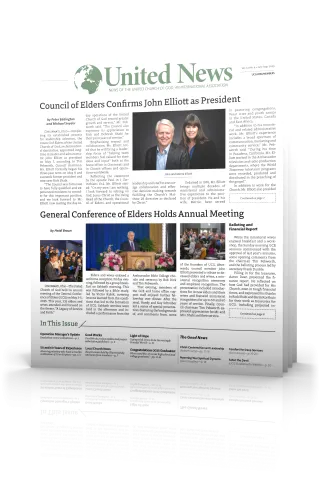Christ-Centered Servant Leadership

We have been called by God the Father to develop the principles of leadership that Jesus Christ modeled and taught.
We all probably question whether we even want to be a leader and face the pressure of motivating others!
The apostle Paul instructs us to “consider one another in order to stir up love and good works, not forsaking the assembling of ourselves together, as is the manner of some, but exhorting one another, and so much the more as you see the Day approaching” (Hebrews 10:24-25, emphasis mine throughout). We see the Day approaching!
Every Sabbath and Holy Day is a gift-wrapped opportunity to practice Christ-centered servant leadership (CCSL). Pentecost, which we recently observed June 1, teaches that we are firstfruits (James 1:18) in training to become Spirit-born leaders serving under Jesus Christ in His millennial government and Kingdom of God—fulfilling roles such as kings (Revelation 5:10), priests (Isaiah 61:6), teachers (Isaiah 30:20-21), judges (1 Corinthians 6:2-3) and mayors (Luke 19:17).
We don’t know how to be a king or queen! But we know Psalm 73:24 promises, “You guide me with your counsel, leading me to a glorious destiny” (New Living Translation).
CCSL must be more than just a nice ideal. It must become a core spiritual value that dramatically changes the importance of our relationship with God and people. We need God the Father and Jesus Christ living in us through the Holy Spirit of power, love and a sound mind (2 Timothy 1:7)—the mind of Christ (Philippians 2:5). Imagine you having
such access!
Love and humility
We must regularly examine how we are living up to the definitions of agape love in 1 Corinthians 13 such as “love does not parade itself, is not puffed up . . . does not seek its own” (verses 4-5). This blends seamlessly with Philippians 2:3-4: “Let nothing be done through selfish ambition or conceit, but in lowliness of mind let each esteem others better than himself. Let each of you look out not only for his own interests, but also for the interests of others.”
Jesus gave up His divine privileges and humbled Himself just by becoming a human!
The core values of CCSL are agape love and humility. Listed first among the fruits of the Spirit, love is something that no human can work up (Galatians 5:22-23). Interestingly, humility is different in that the Bible specifies “humble yourselves” and “be clothed with humility” (1 Peter 5:5-6). We dress ourselves! We should humble ourselves so God and others don’t have to!
Patiently give time to learn
In Mark 9:33-37, Jesus surprised the disciples by asking, “‘What was it you disputed among yourselves on the road?’ But they kept silent, for on the road they had disputed among themselves who would be the greatest. Jesus corrected them, ‘If anyone desires to be first, he shall be last of all and servant of all.’”
At church potlucks, it’s always a powerful unspoken example when church leaders (often pastors and their wives) wait until last, even though it often means the most desirable entrees have already been dished out!
I have two excuses: It’s often difficult to get people to start through the line so organizers often call for volunteers. My second excuse is that I am always the slowest eater and don’t like to end up eating alone. Yes, these are good excuses but I know that I should wait! I must if I’m going to eat with my wife! Thank God for a powerful example of a mate, friend or member committed to CCSL. We should serve as one for others!
Matthew 20:20-28 is the go-to starting place for Jesus’ teaching about CCSL. Salome, the sister of Joseph (and so Jesus’ aunt) and her two sons of Zebedee asked Jesus to grant the sons to sit on Jesus’ left and right in the Kingdom. Jesus was always approachable—a hallmark of a CCSL. When the 10 heard it, “they were greatly displeased with the two brothers.” They wanted it too!
“‘You know that the rulers of the Gentiles lord it over them, and those who are great exercise authority over them. Yet it shall not be so among you; but whoever desires to become great among you, let him be your servant. And whoever desires to be first among you, let him be your slave—just as the Son of Man did not come to be served, but to serve, and to give His life a ransom for many.’”
The disciples still didn’t get it. During Jesus’ final Passover with them, “a dispute [arose] among them, as to which of them should be considered the greatest” (Luke 22:24). They too gave in to the same old sin, and it should encourage us that Jesus stayed patient with them.
Have you ever marveled that they would squabble at a Passover service! I never noticed before that the dispute might have flamed again because of the Roman-style triclinium they were likely using. This arrangement adopted by Jews in the first century had three couches or cushions arranged in a U-shape. Jesus was not seated in the center of the table as wrongly depicted in da Vinci’s “The Last Supper” painting. The host is in the second spot in from the left side of the table. The eminent disciples lie on the left side proceeding around to the lower right to the servant’s spot. It’s hardly surprising that this order would start the disciples pecking! It was a commonly-used setting in the time, and if the seating was arranged this way, Jesus appears to have used it to teach His disciples lessons. Jesus exemplified the Sermon on the Mount teachings about loving enemies and forgiving others by how He seated Judas to the left of Him in the seat of honor and also washed his feet. Later in the Garden Jesus called him “friend.”
“Blessed are you if you do them”
It was soon after this, perhaps partly in response to their prideful dispute, that Jesus shocked the disciples by washing their feet.
When finished, Jesus asked, “Do you know what I have done to you? You call Me Teacher and Lord, and you say well, for so I am. If I then, your Lord and Teacher, have washed your feet, you also ought to wash one another’s feet. For I have given you an example, that you should do as I have done to you. Most assuredly, I say to you, a servant is not greater than his master; or is he who is sent greater than he who sent him. If you know these things, blessed are you if you do them” (John 13:12-16).
May we keep developing the principles Jesus lived and taught about the highest leadership that will continue to characterize eternity: Christ-centered servant leadership.







